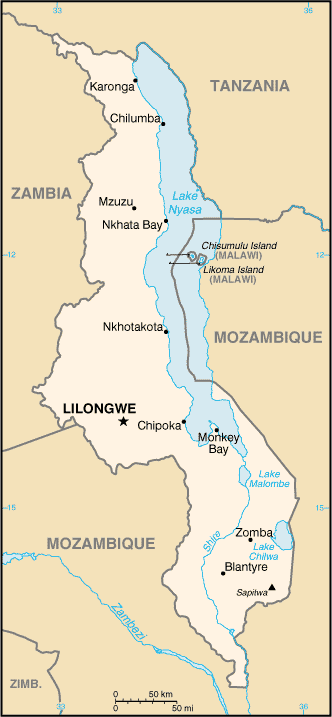Geography of Malawi
|
|
Malawi is situated in southeastern Africa. The Great Rift Valley traverses the country from north to south. In this deep trough lies Lake Malawi, the third-largest lake in Africa, comprising about 20% of Malawi's area. The Shire River flows from the south end of the lake and joins the Zambezi River 400 kilometers (250 mi.) farther south in Mozambique. East and west of the Great Rift Valley, the land forms high plateaus, generally between 900 and 1,200 meters (3,000–4,000 ft.) above sea level. In the north, the Nyika Uplands rise as high as 2,600 meters (8,500 ft.); south of the lake lie the Shire Highlands, with an elevation of 600–1,600 meters (2,000–5,000 ft.), rising to elevations of 2,130 and 3,002 meters (7,000 and 9,800 ft.) at the Zomba Plateau and Mulanje Massif repsectively. In the extreme south, the elevation is only 60–90 meters (200–300 ft.) above sea level.
Malawi is one of Sub-Saharan Africa's most densely populated countries. The population of Lilongwe—Malawi's capital since 1971—exceeds 400,000. All government ministries and the Parliament are located in Lilongwe. Blantyre, Malawi remains Malawi's major commercial center and largest city, having grown from an estimated 109,000 inhabitants in 1966 to nearly 500,000 in 1998. Malawi's President resides in Blantyre. The Supreme Court is seated in Blantyre.
Malawi's climate is generally subtropical. A rainy season runs from November through April. There is little to no rainfall throughout most of the country from May to October. It is hot and humid from October to April along the lake and in the Lower Shire Valley. Lilongwe is also hot and humid during these months, albeit far less than in the south. The rest of the country is warm during those months. From June through August, the lake areas and far south are comfortably warm, but the rest of Malawi can be chilly at night, with temperatures ranging from 5°–14°C (41°–57°F).
Location: Southern Africa, east of Zambia
Geographic coordinates: Template:Coor dm
Map references: Africa
Area:
total:
118,480 km²
land:
94,080 km²
water:
24,400 km²
Area – comparative: slightly smaller than Pennsylvania
Land boundaries:
total:
2,881 km
border countries:
Mozambique 1,569 km, Tanzania 475 km, Zambia 837 km
Coastline: 0 km (landlocked)
Maritime claims: none (landlocked)
Climate: sub-tropical; rainy season (November to May); dry season (May to November)
Terrain: narrow elongated plateau with rolling plains, rounded hills, some mountains
Elevation extremes:
lowest point:
junction of the Shire River and international boundary with Mozambique 37 m
highest point:
Sapitwa 3,002 m
Natural resources: limestone, arable land, hydropower, unexploited deposits of uranium, coal, and bauxite
Land use:
arable land:
34%
permanent crops:
0%
permanent pastures:
20%
forests and woodland:
39%
other:
7% (1993 est.)
Irrigated land: 280 km² (1993 est.)
Natural hazards: NA
Environment — current issues: deforestation; land degradation; water pollution from agricultural runoff, sewage, industrial wastes; siltation of spawning grounds endangers fish populations
Environment — international agreements:
party to:
Biodiversity, Climate Change, Desertification, Endangered Species, Environmental Modification, Hazardous Wastes, Marine Life Conservation, Nuclear Test Ban, Ozone Layer Protection, Wetlands
signed, but not ratified:
Law of the Sea
Geography — note: landlocked

